By all accounts Argentina has made an enormous progress since their default and restructuring some years back. A policy of currency depreciation to raise competitiveness and a good amount of government spending (including tapping central bank profits), allowed Argentina to achieve strong growth and put people to work.
Argentina's unemployment (assuming one believes the government figures) is significantly below the unemployment rate in the US.
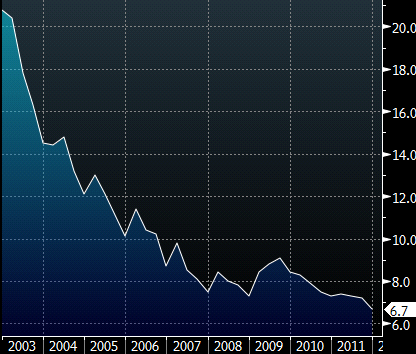
But it seems that cracks are beginning to develop in Argentina's economic miracle.
Reuters: Argentina's industrial production growth in February fell short of market expectations, underlining an economic slowdown in Latin America's No.3 economy, official data showed on Friday.
Factory output rose 2.7 percent year-on-year but declined 1.4 percent from January, falling for a second straight month.
Argentina's economy has boomed in the last nine years at China-like rates, but activity is now cooling, led by sharply slower growth in the industrial sector.
With depreciating currency and higher energy costs, inflation continues to be a problem. Consumer inflation is close to 10% and wholesale inflation is over 12%. External commerce activity has slowed materially, with both imports and exports pace of growth at levels not seen since 2008.
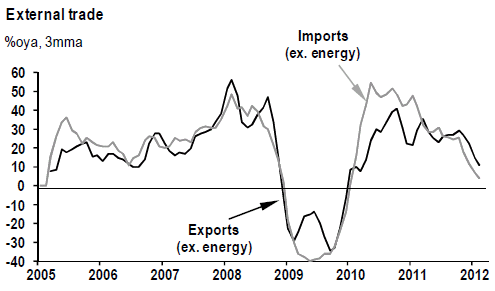
The beginning of this year also brought a large decline in vehicle sales (also comparable to 2008), indicating weakness in domestic consumption.
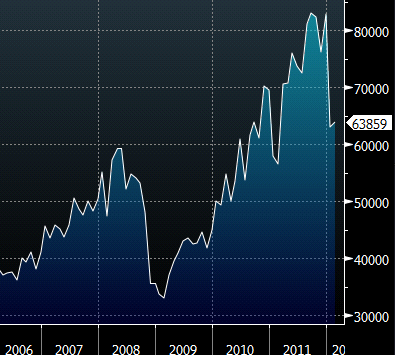
In fact the consumer confidence indicator is also registering a sharp decline.
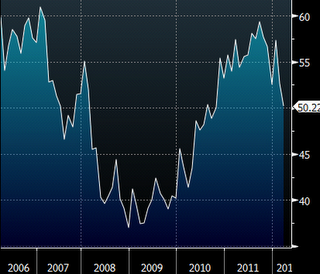
But a major leading indicator pointing to a rapid slowdown actually happens to be Argentina's cement sales. As one would expect, cement sales are highly correlated to construction activity. Growth in cement sales has stalled and construction growth is expected to follow. That in turn points to a slowdown in industrial production.
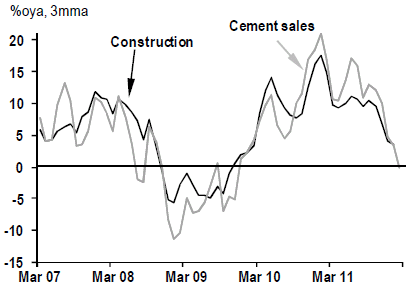
In addition some questionable government policies and president Fernández' falling popularity are adding to concerns about Argentina's immediate future.
Macleans: ... the Fernández period, which was marked first by economic recovery, has lately come to be known for skyrocketing inflation, a growing wealth gap, rifts with neighbouring countries, and distrust of the government. Growing discontent was recently met with an attempt to ramp up patriotic fervour by reigniting the old Falkland Islands dispute with Britain—right on time for the 30th anniversary of a botched military invasion by Argentina’s dictators.
Some of these policies aimed at improving public's support for the government are becoming increasingly desperate. One such action in particular, that has raised eyebrows internationally, involves tapping central bank reserves for more government spending.
Reuters: Argentina's lower house approved a bill on Wednesday to free up more central bank reserves for debt payments, a move that paves the way for the government to keep spending high but which has been criticized as inflationary...
At the same time Argentina has been trying to issue bonds to foreign investors - something they have been unable to do for years since the default/restructuring (which is still tied up in courts abroad). With these economic and political trends, issuing foreign debt will prove to be difficult and the nation will continue relying on its central bank to help fund government programs.
As the global economy is expected to grow considerably slower than in the past decade, Argentina is becoming vulnerable. It is looking as though Argentina's recent economic miracle will be coming under increasing threat going forward.
Argentina's unemployment (assuming one believes the government figures) is significantly below the unemployment rate in the US.

But it seems that cracks are beginning to develop in Argentina's economic miracle.
Reuters: Argentina's industrial production growth in February fell short of market expectations, underlining an economic slowdown in Latin America's No.3 economy, official data showed on Friday.
Factory output rose 2.7 percent year-on-year but declined 1.4 percent from January, falling for a second straight month.
Argentina's economy has boomed in the last nine years at China-like rates, but activity is now cooling, led by sharply slower growth in the industrial sector.
With depreciating currency and higher energy costs, inflation continues to be a problem. Consumer inflation is close to 10% and wholesale inflation is over 12%. External commerce activity has slowed materially, with both imports and exports pace of growth at levels not seen since 2008.

The beginning of this year also brought a large decline in vehicle sales (also comparable to 2008), indicating weakness in domestic consumption.

In fact the consumer confidence indicator is also registering a sharp decline.

But a major leading indicator pointing to a rapid slowdown actually happens to be Argentina's cement sales. As one would expect, cement sales are highly correlated to construction activity. Growth in cement sales has stalled and construction growth is expected to follow. That in turn points to a slowdown in industrial production.

In addition some questionable government policies and president Fernández' falling popularity are adding to concerns about Argentina's immediate future.
Macleans: ... the Fernández period, which was marked first by economic recovery, has lately come to be known for skyrocketing inflation, a growing wealth gap, rifts with neighbouring countries, and distrust of the government. Growing discontent was recently met with an attempt to ramp up patriotic fervour by reigniting the old Falkland Islands dispute with Britain—right on time for the 30th anniversary of a botched military invasion by Argentina’s dictators.
Some of these policies aimed at improving public's support for the government are becoming increasingly desperate. One such action in particular, that has raised eyebrows internationally, involves tapping central bank reserves for more government spending.
Reuters: Argentina's lower house approved a bill on Wednesday to free up more central bank reserves for debt payments, a move that paves the way for the government to keep spending high but which has been criticized as inflationary...
At the same time Argentina has been trying to issue bonds to foreign investors - something they have been unable to do for years since the default/restructuring (which is still tied up in courts abroad). With these economic and political trends, issuing foreign debt will prove to be difficult and the nation will continue relying on its central bank to help fund government programs.
As the global economy is expected to grow considerably slower than in the past decade, Argentina is becoming vulnerable. It is looking as though Argentina's recent economic miracle will be coming under increasing threat going forward.
